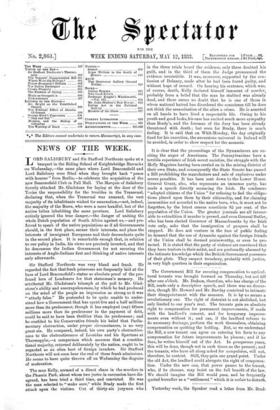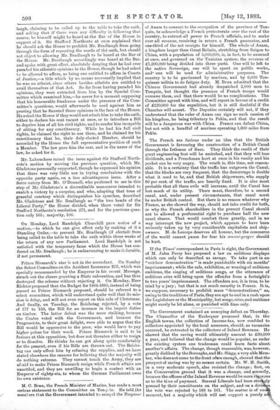Yesterday week, the Speaker read a letter from Mr. Brad-
laugh, claiming to be called up to the table to take the oath, and asking that if there were any difficulty in following that course, he himself might be heard at the Bar of the House in support of it. Sir Stafford Northcote at once explained that he should ask the House to prohibit Mr. Bradlaugh from going through the form of repeating the words of the oath, but should not object to allowing Mr. Bradlaugh to be heard at the Bar of the House. Mr. Bradlaugh accordingly was heard at the Bar, and spoke with great effect, absolutely denying that he had ever paraded his atheistic opinions in the House, though he had asked to be allowed to affirm, as being one entitled to affirm in Courts of Justice,—a title which by no means necessarily implied that he was an atheist, since others besides atheists are entitled to avail themselves of that Act. So far from having paraded his opinions, they were extracted from him by the Special Com- mittee which examined him,—he never for a moment supposing that his honourable frankness under the pressure of the Com- mittee's questions, would afterwards be used against him as proving that he flaunted those opinions in the face of the House. He asked the House if they would not admit him to take the oath, either to declare his seat vacant at once, or to introduce a Bill to deprive him of all his civil rights, and to render him incapable of sitting for any constituency. While he had his full civil rights, he claimed the right to use them, and he claimed for his constituency that he, their duly-elected Member, should be accorded by the House the full representative position of such a Member. The law gave him the seat, and in the name of the law, he asked for it.



































